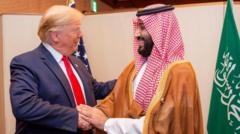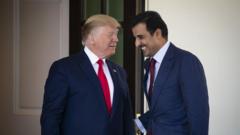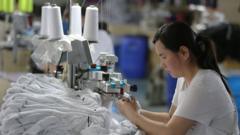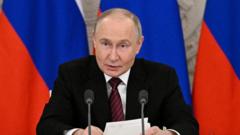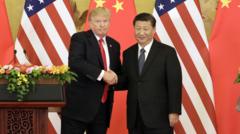Amidst ongoing trade tensions, President Trump expresses optimism about the US-China negotiations in Switzerland, advocating for deeper economic engagement between the nations.**
Trump Hails Positive Shift in US-China Trade Talks, Calls for Continued Negotiations**

Trump Hails Positive Shift in US-China Trade Talks, Calls for Continued Negotiations**
President Trump reports a successful start to trade discussions with China after imposing significant tariffs.**
Donald Trump has characterized the initial day of trade negotiations between US and Chinese officials in Switzerland as a "total reset" of relations, resulting in a "very good" dialogue. The President described the discussions as having progressed in a "friendly, but constructive, manner" on social media.
The backdrop of these discussions is an escalating trade war that has seen the US impose tariffs on Chinese imports reaching 145%, while China responded with retaliatory levies of 125% on select US goods. Following a period of escalating tensions, this weekend marks the first meeting since the US first implemented tariffs earlier this year.
Details on the talks remain scarce beyond Trump's optimistic comments, which continue on Sunday with engagements between China’s vice-premier He Lifeng and US Treasury Secretary Scott Bessent. Trump underscored the importance of enhanced access for American businesses in China, proclaiming: "We want to see, for the good of both China and the U.S., an opening up of China to American business. GREAT PROGRESS MADE!!!"
However, the White House Press Secretary Karoline Leavitt stated earlier that the US would not reduce tariffs without concessions from China. Both nations issued cautionary statements ahead of the meetings, with China emphasizing the need for the US to ease tariffs, while Bessent explained that the core objective was de-escalation, rather than a comprehensive trade agreement.
Chinese state media indicated that Beijing's willingness to engage stemmed from a careful assessment of global expectations and domestic interests, including requests from American companies. A recent BBC report highlighted the struggle of Chinese exporters facing US tariffs, with reports of stalled goods in warehouses.
The trade conflict intensified when Trump declared a universal baseline tariff on imports to the US, famously referred to as "Liberation Day". Around 60 service partners, identified by the White House as major offenders, experienced these higher rates, including China and the EU. Trump justified these measures as corrective steps against years of perceived unfair trade practices.
Moreover, it was recently reported that the US and UK reached an agreement cutting tariffs on UK cars entering the US from 25% to 10% for a set quota, aligning with the UK’s significant car exports, worth approximately £9bn annually. This reflects the broader impacts of tariffs and trade negotiations globally.
As the negotiations progress, the stakes remain high for both countries in navigating their complex economic relationship.

